To can tomato basil soup, start with bright crushed tomatoes and fresh chopped tomatoes, simmering with garlic, onion, and 2 cups of veggie broth in a 4-quart pot. Swirl in ¼ cup cream for silk, then puree to velvety smoothness. Stir in 12 torn basil leaves, 1½ tsp salt, 1 tsp sugar, and ½ tsp pepper. Ladle into jars, seal, and process in a boiling-water bath. Want more details? You’ll discover them just ahead.
Ingredients and Quantity
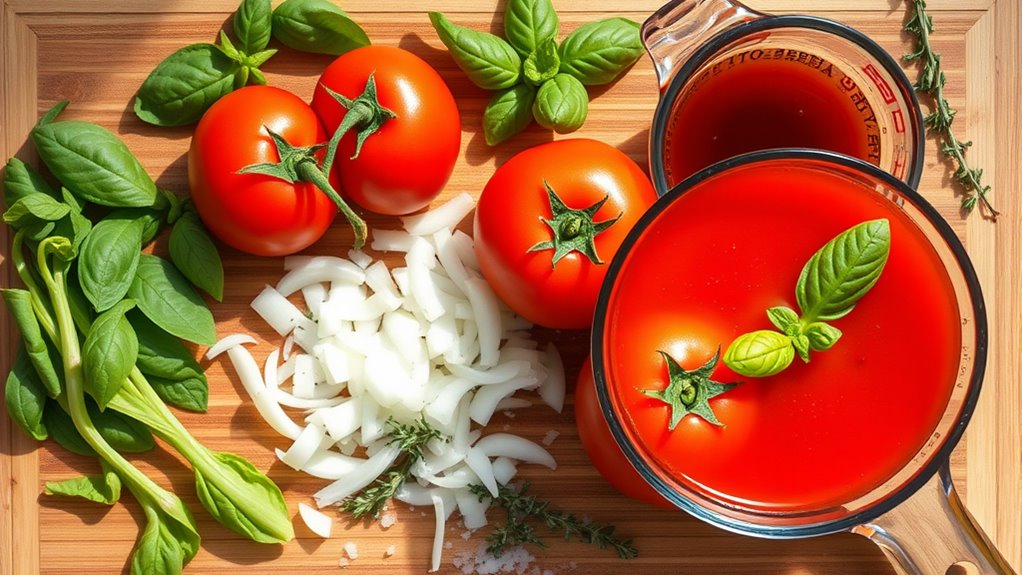
A simple, savory foundation starts with bright crushed tomatoes—28 ounces of canned San Marzano or whole peeled, crushed by hand for a rustic texture. You’ll add fresh tomatoes for brightness: 2 cups chopped. Basil leaves, torn, provide perfume: 12 leaves. For liquid, use 4 cups broth, plus 1 cup water if you want thinner consistency. Salt 1½ teaspoons, sugar 1 teaspoon, pepper ½ teaspoon. Olive oil, 2 tablespoons, helps bring warmth. Garlic? 3 cloves, minced, to awaken depth. Optional cream: ½ cup for silkiness. Yield: about 6 servings.
| Item | Quantity | Notes |
|---|---|---|
| Crushed tomatoes | 28 oz | San Marzano/hand-crushed |
| Fresh tomatoes | 2 cups | chopped |
| Basil leaves | 12 leaves | torn |
Preparations
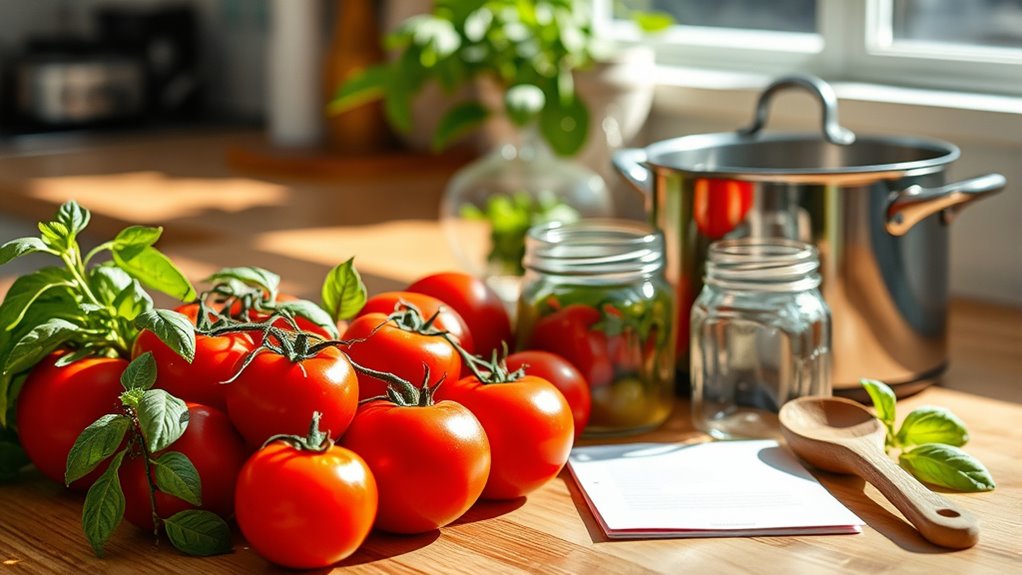
As you prep, rinse the fresh tomatoes and the basil, then pat them dry so nothing dulls their brightness; crush the canned tomatoes by hand for texture, or pulse briefly to keep some rustic bite.
- Rinse, pat, and measure 2 cups crushed tomatoes, 1 cup whole-berry tomatoes, and 1 cup broth to set the base.
- Chop basil leaves finely, 1/4 cup loosely packed, to perfume the pot without bitterness.
- Warm 2 tablespoons olive oil, then bloom 1 small onion minced to translucent sweetness.
- Season with salt, pepper, and a pinch of sugar, watching for a smooth soup consistency and flavor balance that sings.
You’ll sense aromas rise, taste, adjust, and trust simplicity.
Kitchen tools or Kitchenware Required
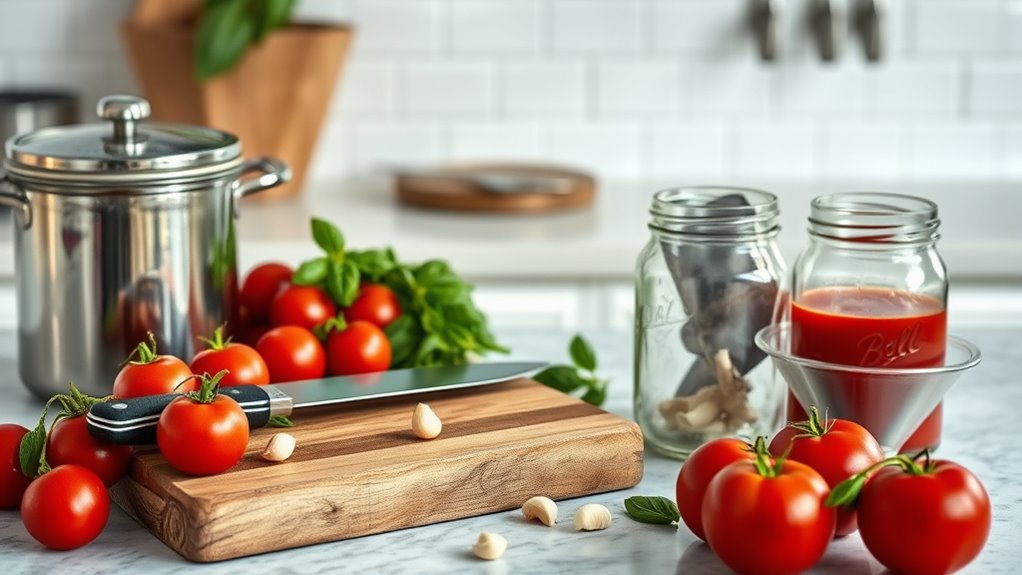
Heat rises from the stove as you gather your tools: a sturdy 4-quart pot, a sharp chef’s knife, a wooden spoon, a whisk, measuring cups, and a ladle, plus a cutting board that’s seasoned with a few tomato-streaks of flavor. You’ll need dependable canning equipment: a funnel, jar lifter, and a boiling-water bath setup, plus clean, labeled soup containers for storage. Your mental menu stays uncluttered as you prep; precision matters, so measure liquids to the nearest tablespoon. The board bears witness to confident cuts, the spoon glides, and the knife sings.
| Tool | Purpose | Sensation |
|---|---|---|
| Pot | Simmer base | Quiet, steady heat |
| Jar lifter | Safe handling | Cold touch, secure grip |
| Funnel | Jar filling | Narrow path, clean pour |
How to Cook
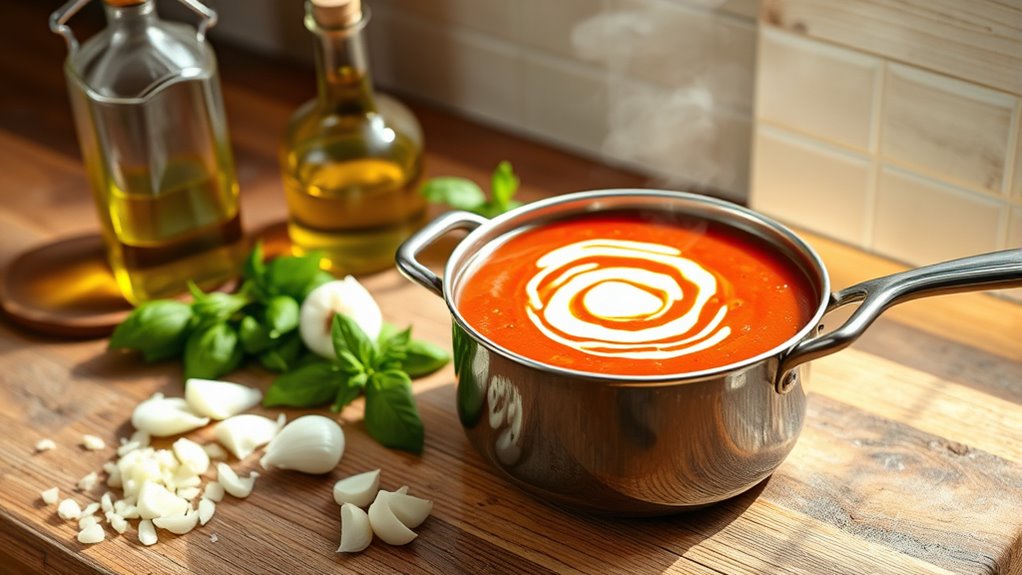
- Reach for the pot and prepare for simmering.
- Add 2 tablespoons olive oil to the pot.
- Add 1 chopped onion and 2 minced garlic cloves; sauté until fragrant, about 3 minutes.
- Stir in 4 cups crushed tomatoes, 2 cups vegetable broth, and a pinch of salt.
- Simmer the mixture for 15 minutes to mellow acidity.
- Use an immersion blender to puree the mixture until smooth.
- Return the pureed mixture to heat.
- Swirl in 1/4 cup cream for a silky texture.
- Adjust seasoning with 1/4 teaspoon sugar, a splash of balsamic vinegar, and pepper to taste.
- Keep the heat gentle and taste as you go to achieve a balanced flavor.
How to Serve
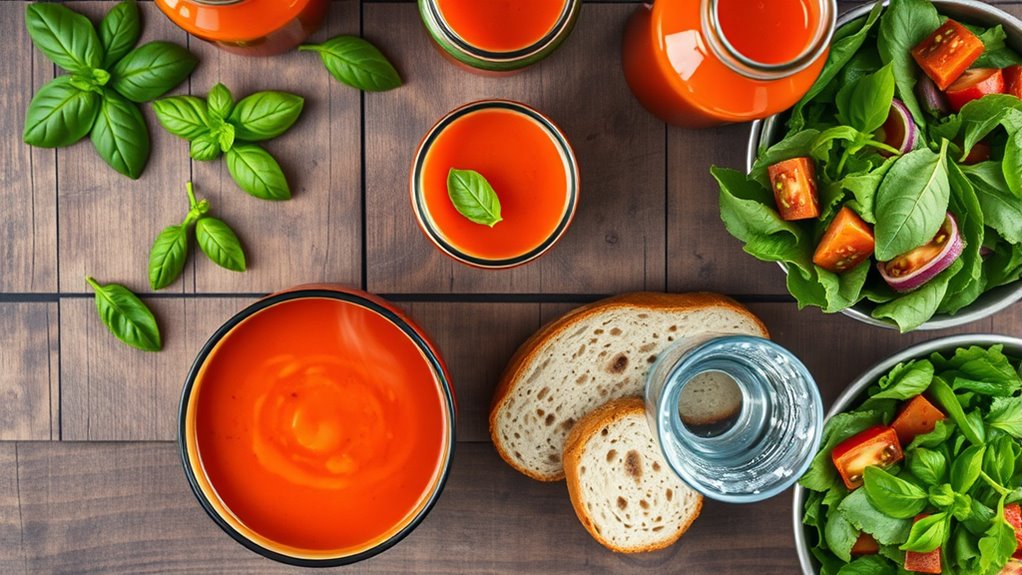
Serve this soup hot, ladled into warm bowls and finished with a bright drizzle of olive oil or a swirl of cream. You’ll find the aroma blooms at the rim, inviting you to sip slowly and notice the tang of tomato, the whisper of basil, the kiss of garlic. For serving, keep bowls preheated to 120 degrees Fahrenheit so heat stays steady for the first spoonful. Pairing options include crusty sourdough slices, lightly toasted until crackly, or a simple baguette brushed with garlic oil. A crisp green salad on the side adds contrast, while a chilled white wine or sparkling water cleanses the palate between bites. Serving suggestions prioritize warmth, balance, and freedom of flavor.
Tips
To get the best depth of flavor, bloom the garlic first in a splash of olive oil over medium heat until it’s just fragrant and barely tingling gold, about 1 to 2 minutes.
Bloom garlic in olive oil until fragrant, just barely tingling gold.
1) canning methods matter: follow trusted processing times and headspace, then label with date for safety and flavor tracking.
2) ingredient substitutions: swap basil for oregano sparingly, or use thyme and a pinch of sugar to brighten acidity without losing brightness.
3) taste as you go: a splash of lemon juice or cider vinegar can brighten the final soup during cooling.
4) texture tweaks: puree to smooth, then strain for velvety consistency that clings to a spoon.
Keep notes, stay precise, and savor the freedom to improvise.
Food Value and Benefit
Canning Tomato Basil Soup is a nutrient-rich dish that offers a flavorful and healthful experience. Each half-cup serving contains approximately 60–90 calories and provides essential vitamins and minerals, making it both satisfying and nourishing.
Nutritional Content:
- Vitamins: Rich in vitamin C, which supports immune health and skin vitality.
- Minerals: Contains potassium and magnesium from tomatoes, important for heart and muscle function.
- Lycopene: A powerful antioxidant found in tomatoes that helps protect cells from damage.
- Aroma-enhancing compounds from basil contribute to flavor and potential digestive benefits.
Benefits of Eating This Recipe:
- Provides antioxidant protection through lycopene, supporting overall cellular health.
- Supports immune function with vitamin C.
- Helps maintain balanced energy levels and appetite control.
- Offers anti-inflammatory properties from garlic and olive oil.
- Promotes a comforting sense of well-being and nourishment.
- Enhances digestive comfort due to the herbal qualities of basil.
Enjoying this soup not only delivers a delicious, smooth, ruby-tinted broth with a bright, herbal lift but also contributes to your health by supplying essential nutrients and supporting your body’s natural balance.
Frequently Asked Questions
How Long Can Canned Tomato Basil Soup Last Once Opened?
Opened canned tomato basil soup lasts about 3–4 days in the fridge. For best flavor, seal tightly, store at 40°F, and respect canned storage guidelines; that way, your soup shelf life stays vibrant and safe.
Can I Make This Soup Dairy-Free or Vegan?
Yes, you can. Dairy-free alternatives and vegan options exist: use coconut milk or almond cream, and oat or cashew cream. Simmer tomatoes, garlic, and basil with 2 cups stock, 1 cup cream substitute, seasoning to taste.
Is Pressure Canning or Water-Bath Canning Recommended?
Pressure canning is risky for tomato-basil soup; use water bath canning for this recipe. You’ll feel the hiss, hear the timer, and savor precise 10-minute processing, 1-inch headspace, and sterilized jars embracing vibrant, freedom-filled steam.
Can I Substitute Fresh Tomatoes for Canned Ones?
Fresh tomato alternatives can work, but expect a brighter, looser texture; substitute 4 cups chopped fresh for 3 cups canned, adjust simmer time. You’ll savor canned tomato benefits in consistency, while savoring seasonal brightness and freedom in flavor.
What Substitutions Work for Basil Allergies or Cost Constraints?
If basil allergies or cost pop up, try mint or cilantro as substitutes; you’ll still savor bright aroma. Use 1 tablespoon chopped dill or parsley per cup, and boost flavor with lemon zest, garlic, and pepper for flavor enhancements.
References
- https://nchfp.uga.edu/how/can_02/tomato_soup.html
- https://www.extension.uidaho.edu/food/recipes/canning/
- https://www.fs.usda.gov/wildflowers/ethics/canning/index.html
- https://www.cdc.gov/foodsafety/communication/food-safety-tips.html
- https://www.uga.edu/
- https://www.nutrition.gov/topics/food-safety/canning-preserving-foods
- https://www.extension.iastate.edu/foodsafety/canning-tomatoes-soup
- https://www.cookforyourlife.org/recipes/tomato-basil-soup/
- https://www.ag.ndsu.edu/food/recipes/preserving-foods/tomato-basil-soup
